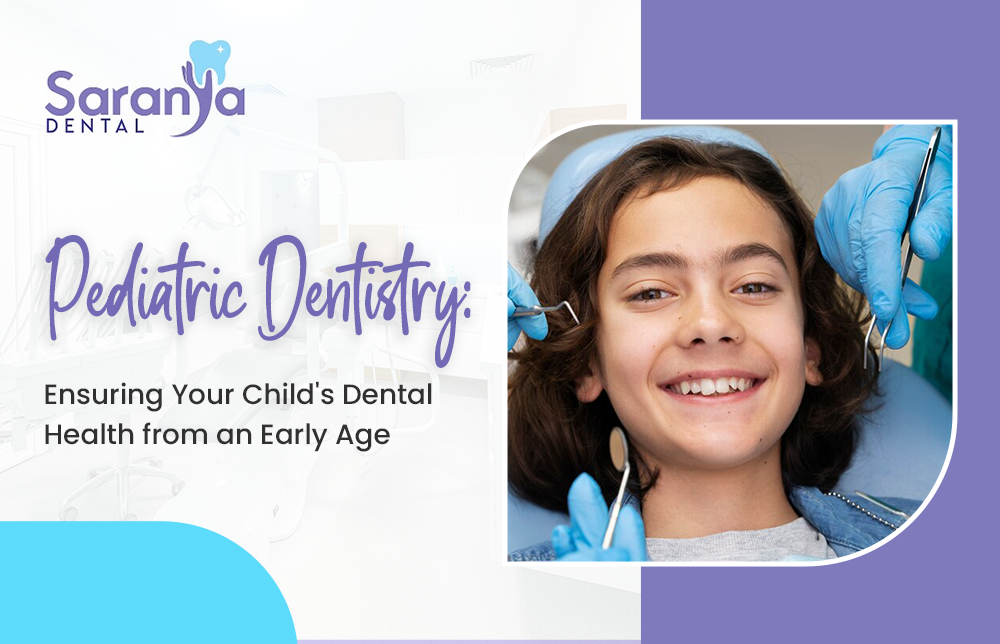Good dental health is a crucial component of a child’s overall well-being. Establishing a foundation of healthy dental habits from an early age can lead to a lifetime of strong teeth and gums, preventing numerous oral health problems. Pediatric dentistry, a specialized field dedicated to the dental care of children from infancy through adolescence, plays a pivotal role in achieving this goal. To know more visit Saranya Dental.
The Importance of Pediatric Dentistry
Pediatric dentistry focuses on the unique dental needs of children. Pediatric dentists receive specialized training that equips them to handle the specific challenges associated with children’s dental health. This training includes child psychology, growth and development, and the management of dental issues related to various pediatric conditions. The primary objective of pediatric dentistry is to ensure that children maintain healthy teeth and gums, promoting positive oral hygiene habits that will continue into adulthood.
Early Dental Visits: Setting the Foundation
The American Academy of Pediatric Dentistry (AAPD) recommends that children have their first dental visit by the age of one or within six months after their first tooth erupts. Early dental visits are essential for several reasons. They allow the dentist to identify and address any potential issues early on, such as tooth decay or developmental abnormalities. These visits also provide an opportunity for parents to receive guidance on proper oral care techniques, diet, and habits that contribute to good dental health.
Preventive Care: The Key to Long-Term Dental Health
Preventive care is the cornerstone of pediatric dentistry. Regular dental check-ups, typically every six months, enable the dentist to monitor the child’s oral health and apply preventive measures as needed. Common preventive treatments include dental cleanings, fluoride treatments, and sealants.
- Dental Cleanings: Professional cleanings remove plaque and tartar buildup that cannot be eliminated through regular brushing and flossing. This helps prevent cavities and gum disease.
- Fluoride Treatments: Fluoride is a mineral that strengthens tooth enamel, making it more resistant to decay. Regular fluoride treatments can significantly reduce the risk of cavities.
- Sealants: Dental sealants are thin, protective coatings applied to the chewing surfaces of the back teeth (molars). Sealants create a barrier that prevents food and bacteria from getting trapped in the grooves of the teeth, reducing the risk of cavities.
Education and Behavioral Guidance
Pediatric dentists play a crucial role in educating both children and parents about the importance of good oral hygiene. They teach children how to brush and floss effectively, emphasizing the importance of doing so twice a day. Additionally, pediatric dentists provide guidance on diet and nutrition, advising parents to limit sugary snacks and drinks that can contribute to tooth decay.
Behavioral guidance is another essential aspect of pediatric dentistry. Dentists are trained to create a positive and comfortable experience for children, helping to alleviate dental anxiety. This is especially important for young children, who may be fearful or apprehensive about dental visits. By fostering a positive dental experience early on, pediatric dentists can help children develop a lifelong appreciation for good oral hygiene.
Managing Common Pediatric Dental Issues
Pediatric dentists are skilled in managing a variety of dental issues that commonly affect children. These can include:
- Early Childhood Caries (ECC): Also known as baby bottle tooth decay, ECC is a severe form of dental decay in young children. It is often caused by prolonged exposure to sugary drinks, especially when children are put to bed with a bottle. Pediatric dentists can provide treatments to address ECC and offer advice on preventing it.
- Dental Injuries: Children are prone to accidents and injuries that can affect their teeth. Pediatric dentists are equipped to handle dental emergencies, such as chipped, fractured, or knocked-out teeth.
- Malocclusion: Malocclusion refers to misalignment of the teeth or jaws, which can affect a child’s ability to chew, speak, and maintain oral hygiene. Pediatric dentists can identify malocclusions early and refer children to orthodontists for appropriate treatment.
Conclusion
Ensuring your child’s dental health from an early age is vital for their overall health and well-being. Pediatric dentistry provides the specialized care necessary to address the unique dental needs of children, from infancy through adolescence. By establishing a foundation of good oral hygiene habits, regular dental visits, and preventive care, parents can help their children achieve and maintain healthy teeth and gums for a lifetime. To know more contact us today.

